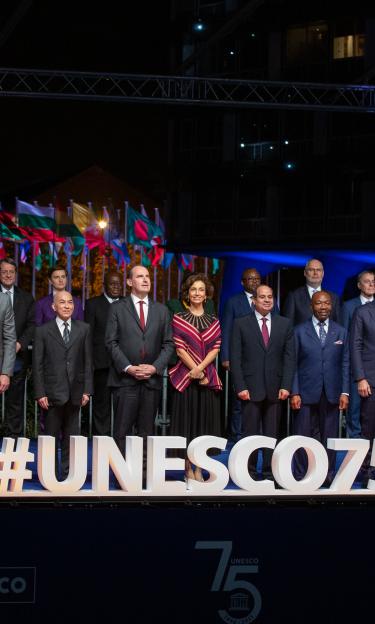.png?h=bcadfd69&itok=Qt6_yfIK)
History of UNESCO
UNESCO is the United Nations Educational, Scientific and Cultural Organization. It seeks to build peace through international cooperation in Education, the Sciences and Culture. UNESCO’s Constitution was adopted in London in 1945, it entered into force in 1946.
After two World Wars in less than thirty years, UNESCO was born of a clear vision: to achieve lasting peace, economic and political agreements among States are not enough. We must bring people together and strengthen the intellectual and moral solidarity of humankind, through mutual understanding and dialogue between cultures.
Over the years, UNESCO has launched pioneering programmes to achieve this.
UNESCO mobilized philosophers, artists, intellectuals from every nation. From the very beginning we debunked racist theories and we developed innovative projects that changed the world:
- The Universal Copyright Convention (1952)
- Man and the Biosphere programme (1971)
- World heritage Convention (1972)
- Convention for the Safeguarding of the Intangible Cultural Heritage (2003)
UNESCO gave rise to global centres of scientific research, from CERN (1952) to SESAME (2017), and developed a global tsunami early warning system. UNESCO brought together experts and scholars to write the first ever general history of Africa and all five continents.
UNESCO carried out literacy campaigns that spearheaded the development of nations, in Italy… in the Republic of Korea... in Afghanistan.
UNESCO established universal principles for scientific ethics and the human genome, and protected the best that humanity has to offer: the temples of ancient Egypt…. saved from rising waters; The treasures of Venice….and Angkor; The old Bridge of Mostar… rebuilt after war
UNESCO in numbers
benefit from the South China Sea Tsunami Advisory Center.
Faced with the challenges of our age, UNESCO’s mandate is more relevant than ever – and with all our Member States, UNESCO continues to lead the way forward.
- By imagining the futures of education to navigate to our new world and to live in peace with others and with the planet
- By establishing common standards on open science and the ethics of artificial intelligence
- By developing new tools to fight new forms of racism, hate speech and misinformation
UNESCO works on the ground, in Beirut, In Mosul, to revive the spirit of the people.
After 75 years, our mission is as critical as ever: the world needs education, science, culture and information. The world needs humanity.


